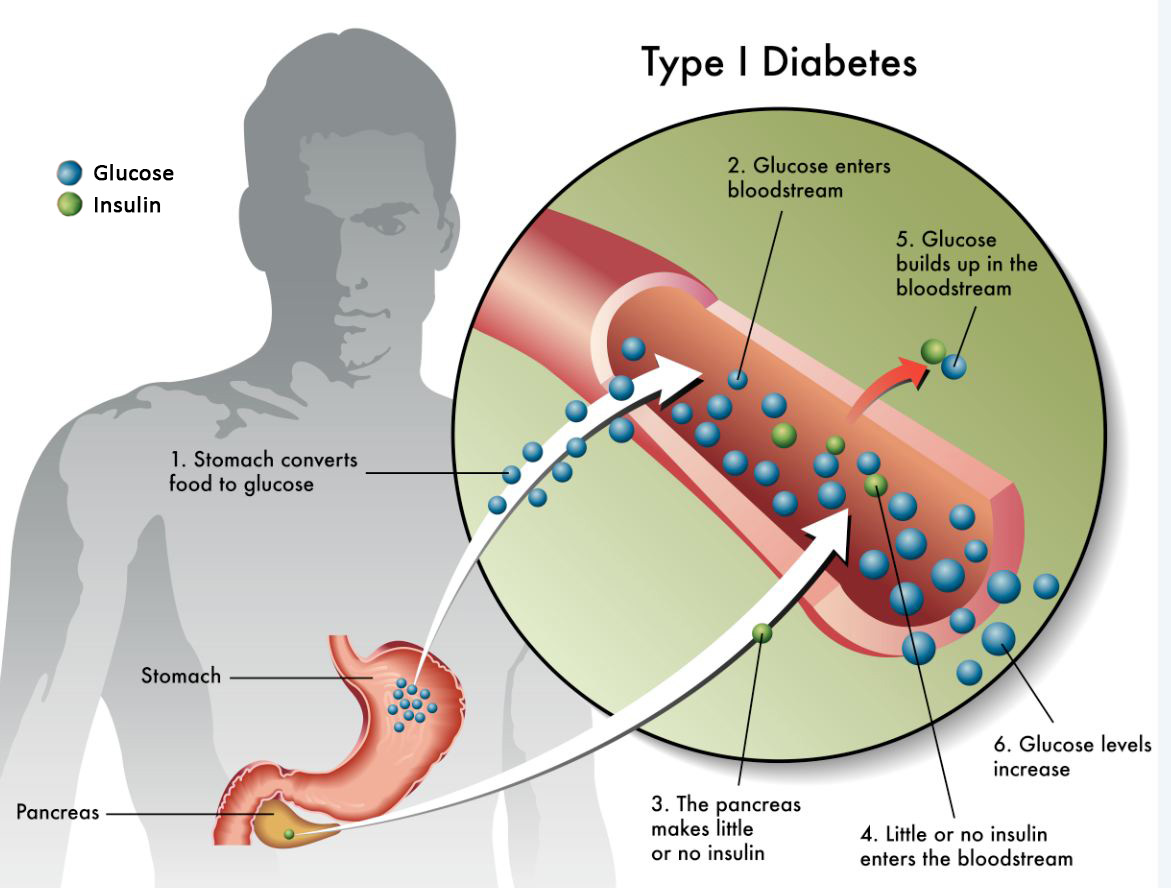What is Diabetes?
Diabetes, or diabetes mellitus, is a chronic condition where the body struggles to produce or use insulin properly. Insulin, a hormone produced by the pancreas, regulates how the body stores and uses glucose and fat derived from food. When this system is disrupted, blood sugar levels become elevated, leading to diabetes.
Causes of Diabetes
Diabetes occurs due to one or more of the following:
- The pancreas produces no insulin.
- The pancreas produces insufficient insulin.
- The body’s cells resist insulin, a condition known as insulin resistance.
Prevalence
Approximately 38.4 million Americans live with diabetes, with nearly a quarter unaware they have it. Additionally, 97.6 million adults have prediabetes, a precursor to type 2 diabetes.
Types of Diabetes
1. Type 1 Diabetes
- Cause: The immune system attacks insulin-producing beta cells in the pancreas.
- Effect: No insulin production, requiring lifelong insulin injections.
- Symptoms: Often appear in individuals under 20 but can develop at any age.
2. Type 2 Diabetes
- Cause: The body becomes resistant to insulin or produces inadequate amounts.
- Effect: Elevated blood sugar levels due to poor glucose absorption.
- Prevalence: Most common form, affecting over 36 million Americans. Often associated with obesity but can occur in lean individuals. It is increasingly seen in children due to rising obesity rates.
3. Prediabetes
- Description: Blood sugar levels are higher than normal but not high enough for a diabetes diagnosis.
- Risk: Without intervention, prediabetes can progress to type 2 diabetes.
4. Gestational Diabetes
- Cause: Hormonal changes during pregnancy disrupt insulin function.
- Risk Groups: More common in individuals over 25, those overweight before pregnancy, or those from certain ethnic groups.
- Post-Pregnancy: Blood sugar levels typically normalize after childbirth, but it increases the risk of developing type 2 diabetes later.
5. Other Types
- Type 3c Diabetes: Results from pancreatic damage or removal.
- Monogenic Diabetes: Caused by genetic mutations, presenting in infancy or young adulthood.
- Type 3 Diabetes: A proposed term linking Alzheimer’s disease with brain insulin resistance.
Symptoms of Diabetes
- Common Symptoms:
- Increased thirst and hunger
- Frequent urination
- Fatigue
- Blurred vision
- Unexplained weight loss (in type 1 diabetes)
- Slow-healing sores
- Gestational Diabetes: Symptoms may overlap with normal pregnancy signs, making testing crucial.
Diagnosing Diabetes
Testing for diabetes involves measuring blood glucose levels. Key tests include:
- A1c Test: Measures average blood sugar over 2–3 months.
- Diabetes: ≥6.5%
- Prediabetes: 5.7–6.4%
- Fasting Blood Sugar Test:
- Diabetes: ≥126 mg/dL after an 8-hour fast.
- Prediabetes: 100–125 mg/dL.
- Random Blood Sugar Test: A level ≥200 mg/dL may indicate diabetes.
- Glucose Tolerance Test: Measures response to a sugary drink over two hours.
- Diabetes: ≥200 mg/dL.
- Prediabetes: 140–199 mg/dL.
Treatment and Management
Lifestyle Changes
- Diet: Focus on whole grains, fruits, vegetables, lean proteins, and healthy fats while limiting sugar, alcohol, and refined grains.
- Exercise: At least 30 minutes of moderate activity most days, plus strength training twice weekly.
- Weight Management: Losing excess weight can improve insulin sensitivity.
Medications
- Insulin Therapy: Essential for type 1 diabetes and some cases of type 2 diabetes.
- Oral Medications:
- Metformin: Lowers glucose production.
- SGLT2 Inhibitors: Flush glucose through urine.
- DPP-4 Inhibitors: Enhance natural insulin release.
- Injectables:
- GLP-1 receptor agonists (e.g., semaglutide) reduce blood sugar and appetite.
Complications of Unmanaged Diabetes
- Short-term: Ketoacidosis, low blood sugar (hypoglycemia).
- Long-term: Vision loss, kidney damage, nerve damage, heart disease, and amputations.
Prevention and Remission
- Type 1 Diabetes: Not preventable due to its autoimmune nature.
- Type 2 Diabetes: Prevention strategies include:
- Healthy eating habits.
- Regular physical activity.
- Weight loss.
- Remission: Achievable for some with type 2 diabetes through weight loss and lifestyle changes, but not guaranteed to be permanent.
Key Takeaways
- Diabetes is a serious but manageable condition requiring careful blood sugar control.
- Regular screenings and lifestyle adjustments can help prevent or delay the onset of type 2 diabetes.
- Consult a healthcare provider for personalized advice and management plans.

That’s gud
I love that